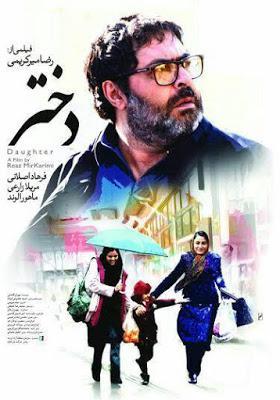
The year 2016 saw the release of two very interesting award-winning films from two countries from two continents. Both films deal with the father-daughter protective relationship under different patriarchal scenarios. Daughter is an Iranian film and presents an interesting tale set in a society where the male members of the family protect their wives and their daughters until they are married with a ferocity that might surprise many in Western developed countries. Graduation is a Romanian film with another interesting tale where the father travels the proverbial extra mile to ensure his daughter benefits from a prized graduate education outside his country that will help her in future life.
The only basic difference between the two films is that the women in Romania enjoy a greater freedom of action compared to the male dominated Iran. In both films, the women have the last word. How interesting it is to find parallel tales emerging from two different communities that grapple with the same concerns almost simultaneously!
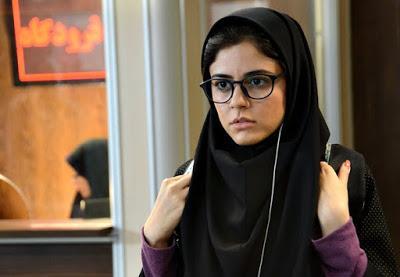
The brave educated daughter (Merila Zare'i) who makes a trip to the country's
capital Teheran against her father's wishes
All over Asia male members of a family fiercely protect their wives, sisters and daughters to the extent that some women are killed to protect the family honor if they choose to have a relationship with a man who is not acceptable to the family. In the film Daughter, the Iranian family is an educated upper middle-class one. The father is a respected technocrat in a large factory in Esfahan (Isfahan) with lots of workers under his supervision. His daughter goes to college and is popular with her female classmates. One of her classmates who is leaving Iran invites her and other classmates to Teheran for a final get together. The daughter wants to attend, confides her wish with her mother, who in turn informs the father. The father turns down the request having concerns for her safety in a strange city. Without the permission of the father, she buys a return air ticket with the intention of returning the same day before her father notices her absence. The young lady attends the get together but despite her best intentions her flight that she boards in cancelled before take-off. The scared young lady has an asthmatic event and has to be treated at the airport. This is mainly the prelude to the film.
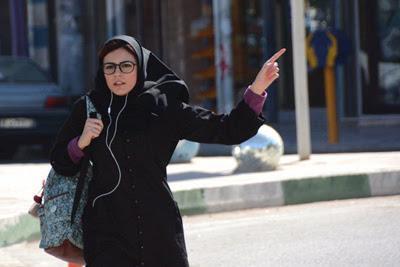
The daughter on her own
Though the film is titled Daughter, the film is essentially about the father. The busy well-meaning technocrat is worried and offended—and has a temper to boot. His only daughter is in medical trouble in a strange city. Beyond the storyline, the director is presenting the world of women in Iran. Women in Iran are increasingly educated and wish to move freely within the country and interact with friends of their own sex. The patriarchal system restricts such activity to “protect” the women. The viewer learns, as the film progresses, that the father has a sister in Teheran, whose marriage he did not approve and had consequently cut off communication with her in anger.
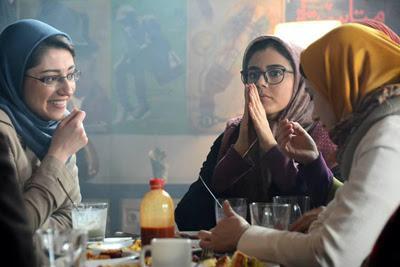
The daughter (center) with her college friends
contemplating choices to make in life
Director Mirkarimi’s scriptwriter is another male Iranian Mehran Kashani , who wrote the script of Majid Majidi’s The Song of Sparrows (2008) and Hamid Rahmanian’s Daybreak (2005). Mirkarimi and Kashani take pains to show the world of the daughter’s aunt with care. The aunt loves her brother and niece. When in trouble the daughter takes refuge with her aunt. Emancipation of the Iranian ladies permeates through the film, while men are shown as the emotionally weaker sex despite their outward bravado. Director Mirkarimi is credited with an earlier feature film Under the Moonlight (2000) which created a lot of interest at Cannes for its social and religious content. Three of Mirkarimi’s feature films were official Oscar submissions from Iran. In 2017, instead of Daughter, Asghar Farhadi’s The Salesman was the official submission. (And the Farhadi film has made the final nomination for the Best Foreign film Oscar, as I write this review.)
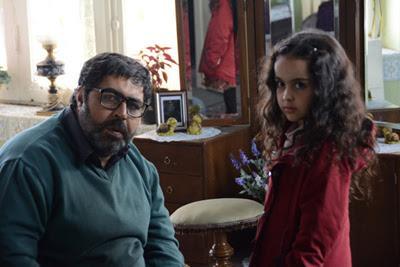
The father (Farhad Aslani) looking at his sister's life sympathetically
for a change
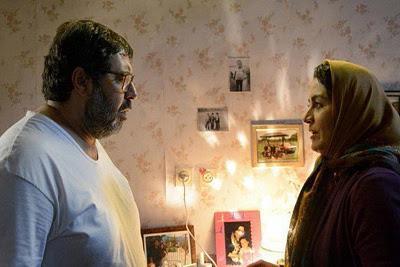
The father begins to empathize with the
women family members he controlled
Mirkarimi seems to be a director good at asking interesting questions through his films. Mirkarimi’s Daughter not so innocently makes a case for the women of Iran as its closed society evolves in a male dominated nation. Its case for the ability of educated women to make informed choices in a patriarchal world is placed before the viewer. It is not a religious cleric who realizes his past mistakes but an educated technocrat who can run a factory efficiently, who stumbles when it comes managing his family. Daughter makes an environmental comment on pollution in Isfahan as a flight landing is stated as the reason for the cancellation of domestic flight. Mirkarimi and Kashani do not rock the boat and leave the film's closing open ended. That’s clever Iranian cinema. The direct and indirect messages come through, both for the Iranian and foreign audiences.
Daughter is not just important for carrying a social message, it shows the maturity of Iranian cinema's screenplay writing and direction capabilities under strict censorship laws.
P.S. Daughter and Asghar Farhadi’s The Salesman are two outstanding Iranian works included in the author’s top 10 films of 2016—the only two films from Asia. Graduation, a Romanian film, mentioned in the above review is also on this list. Daughter deservedly won the Golden Peacock for the best film at the International Film Festival of India-Goa, as other films competing were not of consequence. Daughter also won the best actor award for Farhad Aslani who played the role of the father at the Moscow International Film Festival.

